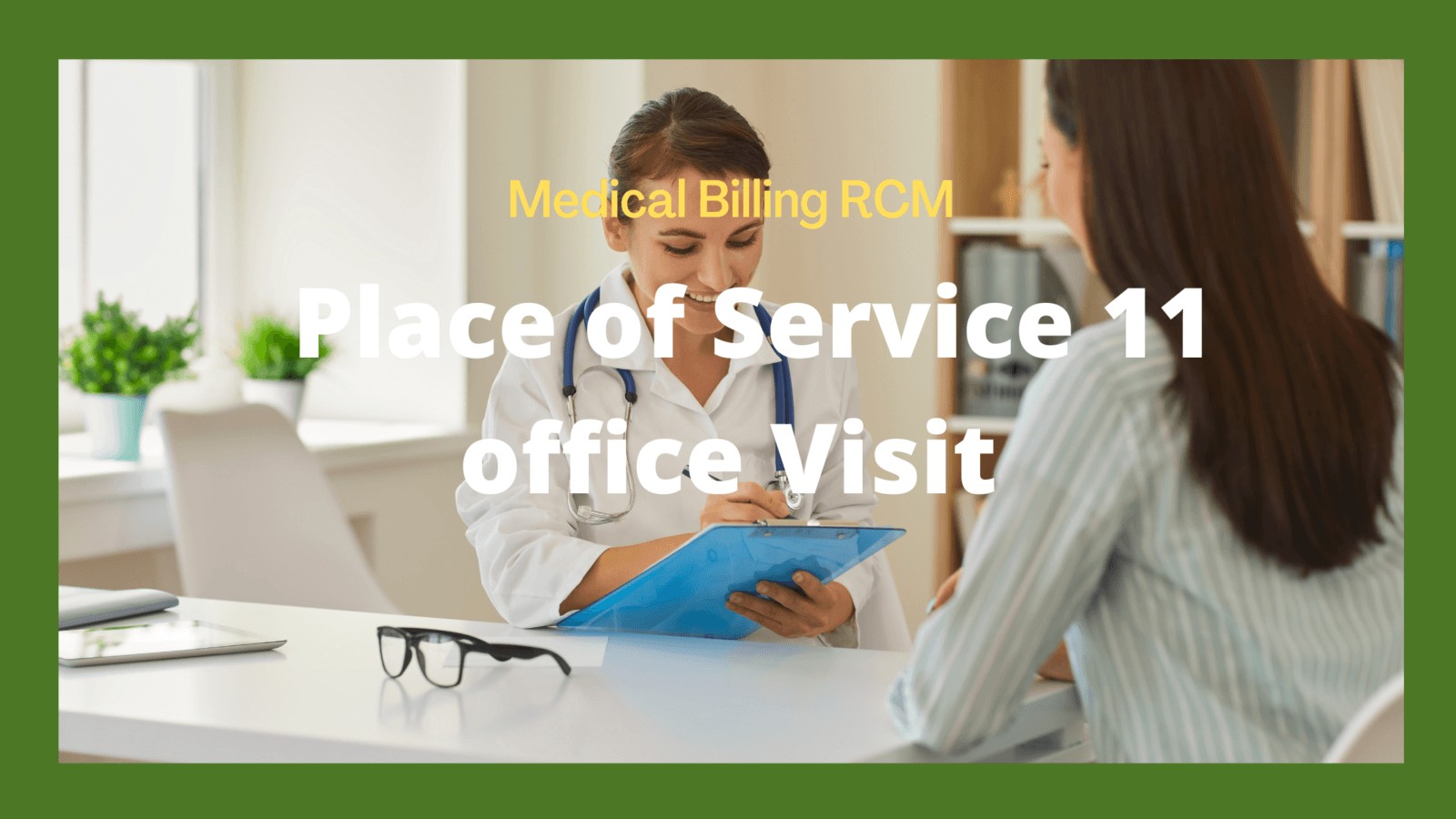Place of Service 11 (POS 11) in Medical Billing is described as an office visit of any doctor or provider by the patient.
If a patient visits a doctor in a clinic in medical terms it is called an “Office Visit” and the used code to denote this office visit is 11 place of service. The services were provided at an office Location, other than SNF- skilled nursing facility, Military Treatment Center, Hospital visit Community health center, local public health clinic, or intermediate care facility (ICF), which is called the place of service 11 or POS 11.
“In HCFA 1500 Form block 24B specifies for an office visit was performed for the patient.“
Place of Service 11 is used in medical billing to identify services provided in providers office. Healthcare providers must use this code when submitting claims for Medicare patients who receive care in a physician’s office or other outpatient.
To ensure accurate documentation and billing, healthcare providers must also include other relevant medical billing codes, such as CPT codes, which describe the specific healthcare services provided.
Table of Contents
- Difference between POS 11 and POS 22 in Medical Billing?
- What is POS 11 in Medical Billing?
- Why is POS 11 Important in Medical Billing?
- How to Use POS 11 in Medical Billing?
- Other Imp. Place of Service Codes
- FAQs:
- Conclusion:
- Related Articles:
Difference between POS 11 and POS 22 in Medical Billing?
If a provider billed a provider’s office (POS 11) for a minor surgical procedure that actually should be performed in a hospital outpatient dep/ POS code 22 and get a higher payment from insurance due to inappropriate billing. These place of service codes are made to reduce the fraud and abuse of billing. Insurances, patients and providers get their services and payments in an ethical way under the supervision of the government health department.
Note – POS 11 or 11 Place of service is also can be used when services are performed in a separate physician’s office on the hospital in the hospital campus and in that case physician’s office is not considered a provider-based department of the hospital.
What is POS 11 in Medical Billing?
Place of service 11 is a two-digit numerical code that represents a specific place of service where healthcare services were provided. In medical billing and coding, the POS- Place of Service is an important component of the claim form that helps to identify where the patient received care or services.
POS 11 refers to services provided in an office of a physician or other health care practitioner who is qualified to bill for Evaluation and Management (E&M) services.
Why is POS 11 Important in Medical Billing?
POS 11 plays a crucial role in medical billing for several reasons. Here are a few reasons why 11 Place of Service is significant:
- Reimbursement: Insurance companies use POS codes to determine the amount of reimbursement for healthcare services rendered. By using the correct POS code, healthcare providers can ensure they receive the appropriate reimbursement for their services.
- Compliance: Medical billing is subject to various regulations, including compliance with HIPAA, Medicare, and Medicaid. The correct use of POS codes is essential to ensure compliance with these regulations.
- Claims Processing: The correct use of POS codes helps to ensure that claims are processed quickly and accurately. By using the right POS code, healthcare providers can avoid delays in payment or claim denials.
How to Use POS 11 in Medical Billing?
Using Place of Service 11 in medical billing is relatively straightforward. Here’s how to use POS 11:
- Determine the Place of Service: The first step is to determine where the healthcare service was provided. In the case of Place of service code 11, the service was provided in an office of a physician or other health care practitioner.
- Code the Claim: Once you’ve determined the place of service, you’ll need to code the claim with the appropriate POS code.
- Submit the Claim: After coding the claim, you can submit it to the insurance company for processing.
Other Imp. Place of Service Codes
Apart from POS 11, there are several other place of service codes in medical billing. Here are a few examples:
- POS 21: Inpatient Hospital: This code is used when healthcare services are provided in a hospital.
- POS 22: On Campus-Outpatient Hospital: This code is used when healthcare services are provided in an outpatient hospital.
- POS 31: Skilled Nursing Facility: This code is used when healthcare services are provided in a skilled nursing facility.
- POS 32: Nursing Facility: This code is used when healthcare services are provided in a nursing facility.
FAQs:
Ans. Using the wrong POS code can result in delayed payment or claim denials. It’s essential to use the correct POS code to ensure timely and accurate processing of claims.
Ans. Yes. There are exceptions to using POS 11, such as when healthcare services are provided in a hospital or other healthcare facility.
Ans. Yes, you can use POS 11 for telehealth services, provided the healthcare service was provided in an office of a physician or other health care practitioner.
Ans. POS 11 is used when healthcare services are provided in an office of a physician or other health care practitioner. On the other hand, POS 22 is used when healthcare services are provided in an outpatient hospital setting.
Conclusion:
Place of Service 11 is a important component of medical billing and coding that helps to identify the place of service where healthcare services were rendered. Using the correct POS code is essential for accurate and timely processing of claims, compliance with regulations, and ensuring appropriate reimbursement and lowering the denial.
In summary, this article has covered all you need to know about POS 11 in medical billing. We hope that you now have a better understanding of POS 11 and its significance in medical billing. Remember to use the correct POS code when billing for healthcare services to avoid delays in payment or claim denials.
Related Articles:
- POS 61| Place Of Service 61 in Medical Billing
- Place of Service 20 – POS 20 in Medical Billing 2026
- POS 34 | Place of Service 34 in Medical Billing
- Place of Service 19 | POS 19 Description in Medical Billing (2026)
- Place of Service 24 – POS 24 in Medical Billing (2026)
- POS 22 in Medical Billing (2026)
- Place of Service 99 – Other Place of Service (2026)
- Place of Service Codes List in Medical Billing 2026
- Place of Service 12 – POS 12 in Medical Billing (2026)
- Place of Service 81- POS 81 in Medical Billing (2026)
The author and contributor of this blog "NSingh" is working in Medical Billing and Coding since 2010. He is MBA in marketing and Having vaste experience in different scopes of Medical Billing and Coding as AR-Follow-up, Payment Posting, Charge posting, Coding, etc.

